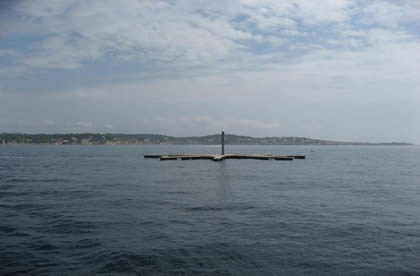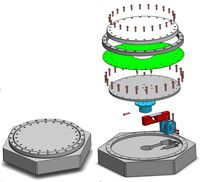When existing ports are saturated, and new or
expansion construction is impossible,
optimization of existing port bodies of water
becomes the only alternative, and proves that
innovation is the answer to this problem. The
objective is to effectively meet the
requirements of the customers and users,
compromising between the constraints to
optimizing an existing port and the design
concepts of a new port:
- Increase port handling capacity while
remaining within the site boundaries;
- Protect people and ships by limiting wave
agitation on the port area;
- Keep project costs within the customer's
budget;
- Limit their footprint, and more broadly
their environmental impact, to improve
integration into the marine environment.
Taking these elements into consideration, the choice of
getting involved in research and development of
alternative innovative solutions led ACRI-IN to expand
on a little used idea of hybrid structures (caissons +
rubble mound breakwaters). A research program aimed at
sizing and installing this innovative type of buffer
quay was started, extending technical progress and
understanding in which ACRI-IN has actively participated
for the last several years by:
- Developing and regularly perfecting its digital
calculation tool, RANKINE2D (hydrodynamic force,
transmission, reflection, dissipation of a 2D
structure subjected to wave action).
- Providing physical modeling, uncontested in this
field. ACRI-IN has completed several test programs
in its own laboratory equipped with a wave flume.
- Construction, started in 2007, of Jarlan caissons
for the Port Hercules outer harbor in Monaco.
ACRI-IN was the Project Manager on this project,
designed to protect the extension of the Portier
urban area (digitally pre-sizing protection
structures, physical tests in the wave flume,
computer agitation and currents studies, project
management of the hydraulic structures for improving
the Port of Monaco).
This major project was the opportunity for ACRI-IN to
apply its knowledge of innovative structures, and use
its specifically developed digital sizing tools (RANKINE
2D among others) and its physical modeling methods.
Though most wave absorbing quay projects are essentially
based on the Jarlan caisson, ACRI-IN decided to direct
its R&D towards innovative, alternative, more compact
hybrid structures, combining the caisson idea with a
porous media constituted by rubble mounds.
Our R&D work on this topic was based on two major harbor
improvement projects completed by ACRI-IN since 2010:
- Saint Raphaël Old Port renovation
- Propriano Sailing Harbor renovation
To meet their requirements, we showed the customers our
work on the topic of wave absorbing structures and
offered to implement a hybrid structure for their port
improvement projects.
























